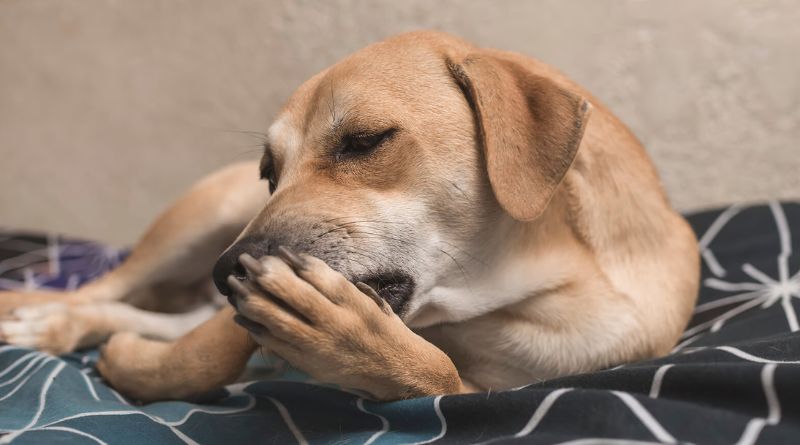If you’ve noticed your dog constantly licking its paws, you’re not alone. Paw licking is one of the most common behaviors dogs exhibit, but it can also be a sign of underlying health issues, allergies, anxiety, or even simple boredom. While occasional paw licking is usually harmless, persistent licking can lead to raw, irritated paws and may indicate a deeper problem that needs attention. As a responsible pet owner, it’s important to understand why your dog may be licking its paws and how to address the behavior effectively.
In this article, we’ll explore some of the most common reasons dogs lick their paws, the potential health risks associated with excessive paw licking, and a range of home remedies to help stop the behavior. By the end, you’ll have a better understanding of how to manage this issue and ensure your dog remains comfortable and healthy.
Table of Contents
Why Do Dogs Lick Their Paws?
Before jumping into solutions, it’s important to understand why your dog may be licking its paws. Paw licking can be caused by a variety of factors, including:
- Allergies: One of the most common causes of excessive paw licking is allergies. Dogs can have allergic reactions to food, pollen, dust mites, or certain chemicals in their environment. These allergies can cause itching and irritation, leading to frequent licking.
- Dry Skin or Dermatitis: Dry, flaky skin can cause discomfort for dogs, especially in colder months. Dermatitis, a skin condition that causes inflammation and irritation, may also result in paw licking.
- Infections: Bacterial or fungal infections, such as yeast infections, can lead to intense itching and licking. A dog may lick its paws to soothe the discomfort caused by these infections.
- Injury or Foreign Objects: If your dog has stepped on something sharp or has a small injury on its paw, it may lick the area to alleviate pain. Similarly, a foreign object like a pebble or stick stuck between their toes can trigger licking.
- Anxiety or Stress: Just like humans might bite their nails when stressed, dogs may lick their paws as a coping mechanism. Separation anxiety, fear of loud noises, or a change in routine can contribute to this behavior.
- Boredom: Dogs that are not mentally or physically stimulated may engage in repetitive behaviors, including paw licking, as a way to pass the time.
- Parasites: Fleas, ticks, and mites can cause itching and discomfort, prompting your dog to lick its paws to relieve the irritation.
Understanding the underlying cause of your dog’s paw licking is essential to selecting the right treatment. If the behavior is persistent or seems to be causing harm to your dog’s paws, consulting a veterinarian is a good first step. However, many home remedies can help alleviate minor issues like allergies, dry skin, and mild irritations.
Home Remedies to Stop Dog from Licking Paws
Now that we understand some of the potential causes of paw licking, let’s explore some practical home remedies you can try to help your dog stop licking its paws.
1. Soothing Epsom Salt Soak
Epsom salt is known for its soothing properties and can help reduce inflammation and discomfort in your dog’s paws. This remedy is particularly helpful if your dog’s licking is caused by mild irritation, dryness, or an allergy-related rash.
How to use:
- Fill a basin or small tub with warm water.
- Add 1-2 tablespoons of Epsom salt and stir to dissolve.
- Gently place your dog’s paws in the water and let them soak for 5–10 minutes.
- Afterward, pat the paws dry with a clean towel.
This soak can help reduce itching and inflammation while providing temporary relief.
2. Aloe Vera for Irritated Skin
Aloe vera has anti-inflammatory and healing properties that can be soothing for dogs suffering from irritated or inflamed paws. If your dog is licking due to dry or cracked skin, aloe vera gel can help hydrate the skin and promote healing.
How to use:
- Apply a thin layer of pure aloe vera gel directly to the affected area of your dog’s paws.
- Allow it to absorb, and don’t rinse it off immediately—let the gel sit for a while.
- Monitor your dog to ensure they don’t lick off the aloe vera before it has a chance to work.
Make sure to use pure aloe vera gel, as many products may contain additives or alcohol that can be harmful to your pet.
3. Oatmeal Bath
Oatmeal is known for its soothing properties, especially when it comes to irritated or itchy skin. An oatmeal bath can help calm inflammation and reduce the urge for your dog to lick its paws excessively.
How to use:
- Grind plain oatmeal (not instant) into a fine powder using a blender or food processor.
- Add the ground oatmeal to lukewarm water and stir to create a milky bath.
- Place your dog in the bath or apply the oatmeal-infused water directly to the affected paws with a cloth.
- Allow the oatmeal to sit for about 5-10 minutes, then rinse off with fresh water.
An oatmeal bath is especially helpful if your dog is licking due to dry skin or allergies.
4. Apple Cider Vinegar Rinse
Apple cider vinegar (ACV) has natural antifungal and antibacterial properties that can help address issues like yeast infections or bacterial growth on your dog’s paws. If you suspect the licking is due to an infection, an ACV rinse may help disinfect and soothe the area.
How to use:
- Mix one part apple cider vinegar with one part water in a spray bottle or bowl.
- Gently apply the mixture to your dog’s paws, focusing on the areas they are licking.
- Let it sit for a few minutes, then rinse thoroughly with water.
Note that apple cider vinegar may sting if your dog has open wounds or cuts on their paws, so use this remedy with caution in such cases.
5. Coconut Oil for Moisture
Coconut oil is known for its ability to hydrate and moisturize dry skin, making it a great remedy for dogs with dry or cracked paws. Additionally, it has antifungal properties that can help address mild skin infections.
How to use:
- Apply a small amount of organic coconut oil to your dog’s paws, massaging it into the skin.
- Allow the oil to absorb, or let it sit for a few minutes before wiping away any excess.
This remedy can be particularly helpful for dogs with dry, cracked paws or minor irritations.
6. Distraction and Mental Stimulation
If your dog’s paw licking is linked to boredom or anxiety, it’s important to address the root cause of the behavior. Engaging your dog in new activities, providing more physical exercise, and offering puzzle toys or treats can help reduce stress and keep them mentally stimulated.
How to use:
- Try increasing the amount of time spent playing with your dog.
- Provide interactive toys, like treat-dispensing puzzles or chew toys, to keep them occupied.
- Consider using calming products, such as anxiety wraps, pheromone diffusers, or calming supplements, if anxiety is a factor.
Regular exercise and mental stimulation are crucial for maintaining your dog’s overall well-being and reducing compulsive behaviors like paw licking.
7. Keep Your Dog’s Paws Clean and Dry
If your dog’s licking is related to dirt, debris, or allergens on their paws, it’s important to keep their paws clean and dry. After walks or outdoor playtime, inspect your dog’s paws for any foreign objects, like rocks or burrs, and gently wash them with water.
How to use:
- Use a soft cloth or dog-safe wipes to clean the paws after outdoor activities.
- Make sure to dry the paws thoroughly to prevent moisture buildup, which could lead to infections.
When to Consult a Veterinarian
While these home remedies can be effective for mild cases of paw licking, persistent licking may indicate an underlying health condition that requires professional attention. If your dog’s paws are red, inflamed, or bleeding, or if the licking persists despite trying home remedies, it’s time to consult a veterinarian. Conditions like bacterial or fungal infections, food allergies, or autoimmune disorders may require prescription medications or treatments.
FAQs
1. Why is my dog licking its paws constantly? Constant paw licking can be caused by allergies, dry skin, infections, injury, or anxiety. It’s important to observe the behavior and look for other symptoms to help determine the cause.
2. Can paw licking cause long-term damage to my dog’s paws? Yes, excessive paw licking can cause raw, irritated skin and potentially lead to infections or secondary issues. It’s important to address the behavior before it results in more serious health problems.
3. Can I stop my dog from licking paws using a cone or bandage? While using a cone (Elizabethan collar) or bandage can temporarily prevent your dog from licking its paws, it’s important to address the underlying cause of the licking to prevent it from happening again.
4. Is it safe to use human products on my dog’s paws? No, many human products, such as lotions or creams, contain ingredients that can be harmful to dogs. Stick to pet-safe products or natural remedies like coconut oil or aloe vera gel.
5. When should I see a vet about my dog’s paw licking? If your dog’s licking is persistent, causes damage to the paws, or is accompanied by other symptoms like swelling, redness, or discharge, it’s best to consult a vet for a proper diagnosis and treatment plan.
Conclusion
Paw licking in dogs can be caused by a variety of factors, but with the right approach, you can manage and alleviate the behavior. By understanding the potential causes
and using safe, natural remedies, you can help your dog stop licking its paws and ensure its overall health and comfort. If the behavior persists or worsens, don’t hesitate to seek professional help from a veterinarian. With patience and care, your dog can enjoy healthier, happier paws.



